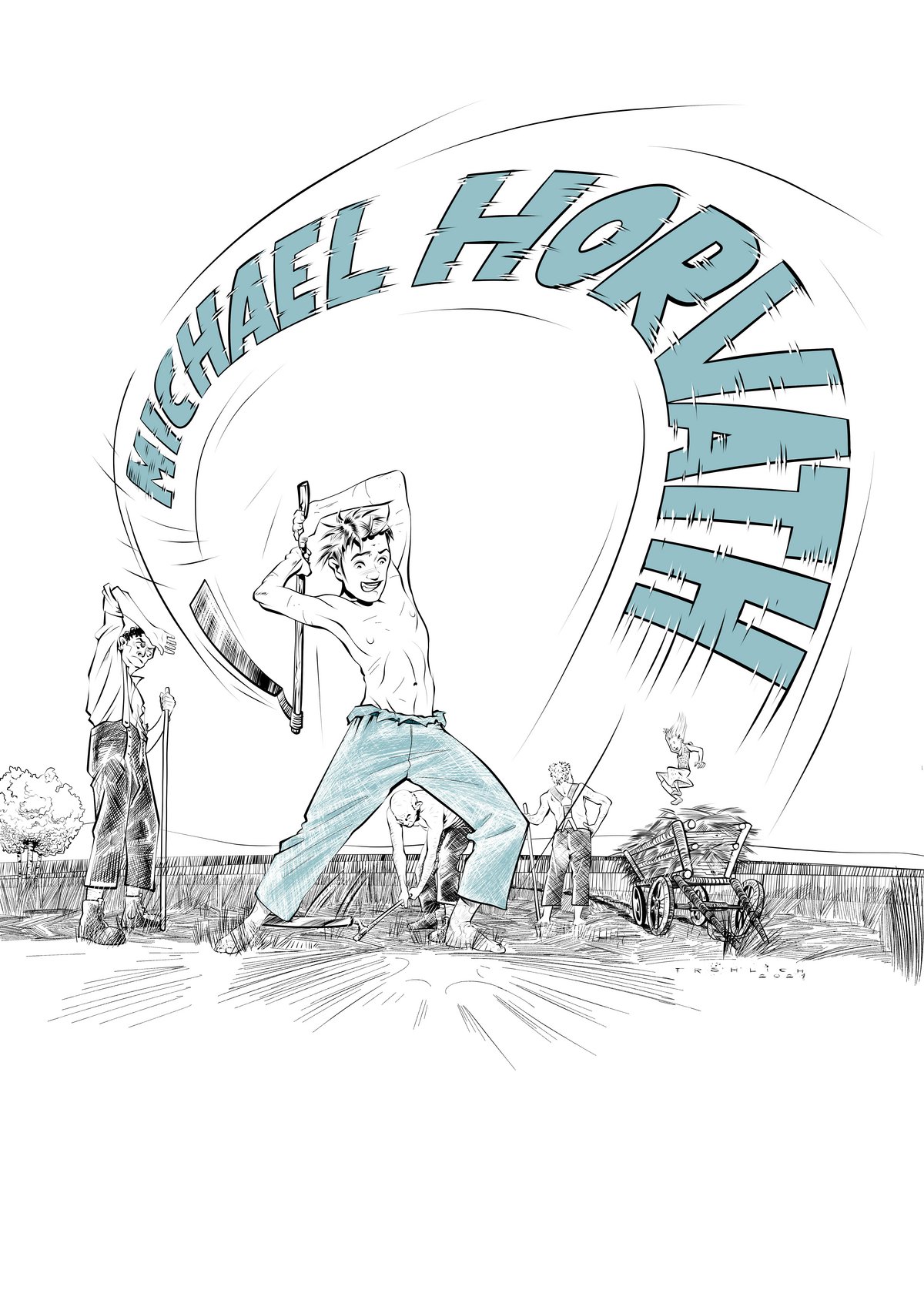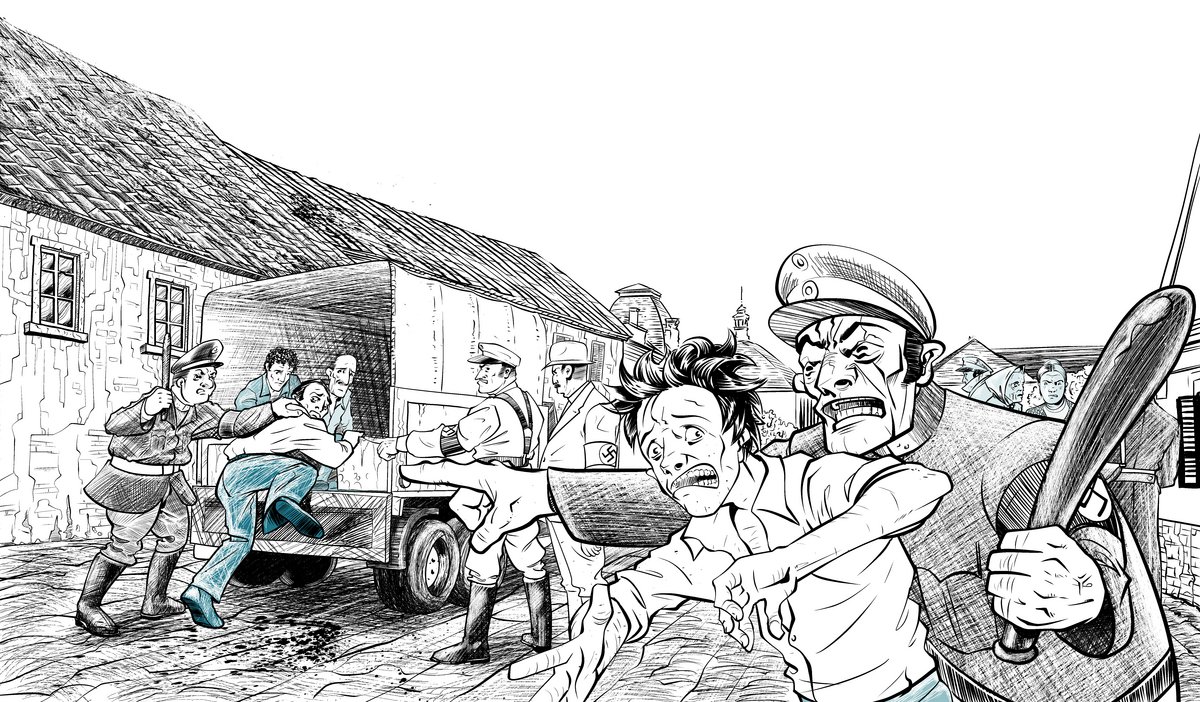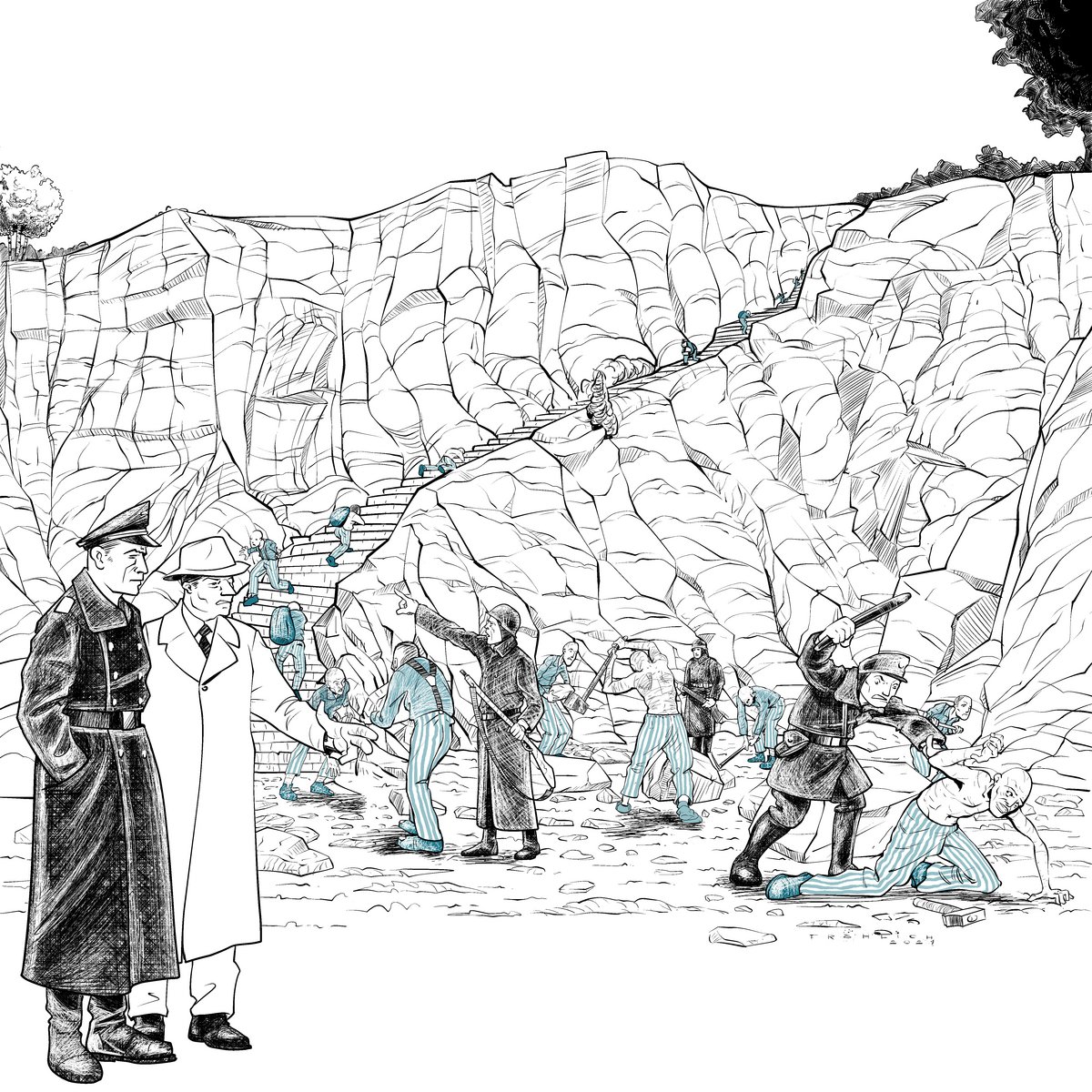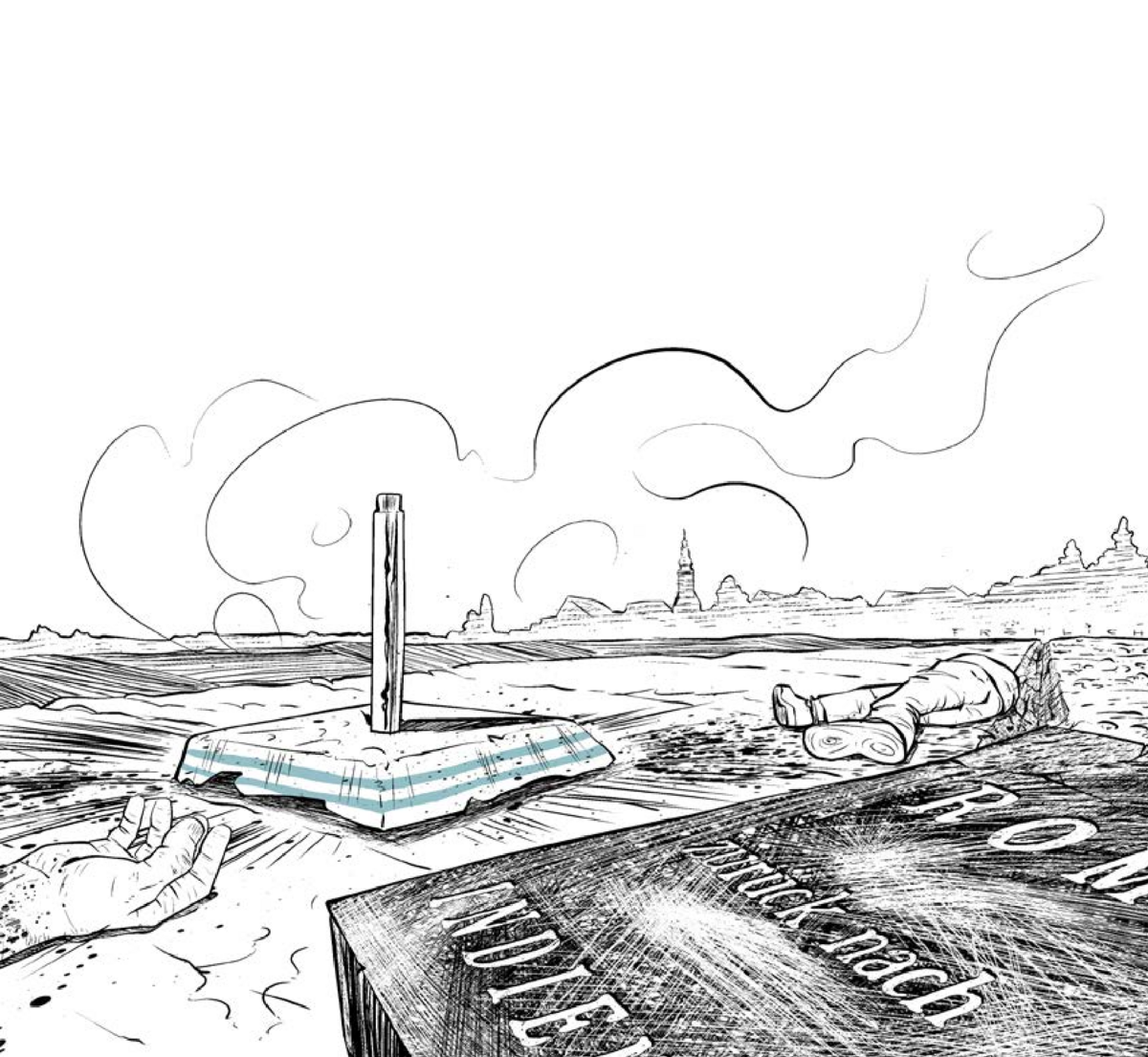In 1938, in a small town in Upper Austria, one of the many Nazi concentration camps was constructed. It was known as the Mauthausen concentration camp. It existed from 1938 to 1945. The camp was run and guarded by the SS. The people who were imprisoned here came from many countries in Europe: Poland, Russia, France, Italy, Germany, Austria and others. They were political opponents, belonged to marginalised groups (e.g. ‘criminals’, ‘asocials’) or were persecuted for anti-Semitic and racist reasons (e.g. Jews). Most of the prisoners were men, but there were also women and children.
In the Mauthausen quarry, the prisoners carried out hard forced labour. In the more than 40 subcamps (Gusen, Steyr, Linz, Ebensee, Vienna...), they were deployed in the arms industry. People lived in overcrowded accommodation. They were not given enough food and clothing, and they starved and died of diseases. SS men beat many prisoners to death, shot them or murdered them in the gas chamber at Mauthausen. In total, almost 200,000 people were imprisoned at Mauthausen and its subcamps. Half of them lost their lives.
The Mauthausen concentration camp was on a hill and could be seen for miles around. Many people were involved with the camp: they worked there, brought deliveries or knew SS men. Almost everyone knew about the death camp. Often, the SS men committed the crimes in full view of the population. On 5 May 1945, the Mauthausen concentration camp was liberated by US troops.
Here, you will read the story of a person who was connected with the Mauthausen concentration camp.
Michael Horvath
Text: Elfie Hackl-Ceran – Illustration: Walter Fröhlich

Michael Horvath is born in 1922 in Oberwart in the state of Burgenland. He grows up with seven siblings. Michael’s family are part of the Roma ethnic group that are mistreated by the majority population and referred to by the demeaning term ‘Zigeuner’ (‘gypsy’). The family lives in poverty in a very simple house with a thatched roof and no running water or electricity, in a Roma settlement in Oberwart.
Because Michael is Roma, he’s not allowed to go to school. So at the age of only eight he goes to work on a farm with other family members. He helps with the hay harvest, threshing the corn and looking after horses.
Later, aged 14, he works as a labourer on road-building works. His colleagues like him because he works hard and is always cheerful. He is given the nickname Mischka.
In March 1938, Austria becomes part of the German Reich under Nazi rule. The Nazis want to remove the Roma, like the Jews, from what they call the German Volksgemeinschaft, ‘ethnic community’. Michael has just turned 16 when he is stopped by the police on his morning walk to work in June 1938. Together with other Roma people he is taken away in a lorry – to an unknown destination.

The lorry takes them to the railway station. From there they travel by train through the night, arriving the next morning at the Dachau concentration camp in Germany. Michael Horvath is now a concentration camp prisoner. He is given the prisoner number 10275 and a set of striped prison clothes, and he’s assigned to a hut, or barrack. Every day he has to do hard labour from morning to night. After three months, he is transferred to the Buchenwald concentration camp, where he stays for two years.
In May 1941, he is sent to the Mauthausen concentration camp. Horvath is now 19 years old and has already spent three years in concentration camps. He has experienced many terrible things. He’s seen people beaten and shot next to him, he’s been brutally beaten himself, he’s gone hungry. Now he must do forced labour in the quarry and nearby building sites in the Mauthausen concentration camp and the nearby Gusen concentration camp. He gets to know prisoners from many countries, including France, Italy, Poland, Czechoslovakia and Hungary. The Jewish and Roma prisoners are treated with particular cruelty.

After the abuse, the hard labour and the hunger, what hurts him most is the insults. The SS men often call the Roma ‘lazy and workshy gypsies’. They must wear the black triangle, which marks out people who are considered ‘workshy’ and ‘asocial’. ‘Why?’, Michael Horvath often asks himself. ‘Why do they call me workshy? I’ve worked my whole life!’
In the quarry, the concentration camp prisoners have to work without gloves in winter, pulling stones out of the frozen snow. The supervisor goads them: ‘Gypsies, do your work! Otherwise it’s off to the crematorium with you!’ There are beatings every day. Many people die on the 186 steps of the ‘stairs of death’. And some prisoners, mostly Jews, are pushed off the edge of the high cliff wall, falling to their deaths in the quarry.
One time, one of the supervisors recognises him as ‘Mischka from Oberwart’. He had seen Michael there before the war when he worked on the roads. This SS man gives him an extra task. He has to clean out the buckets of dog food. Because Horvath is so hungry, he eats the food the dogs haven’t eaten.
In May 1945, US soldiers liberate the Mauthausen concentration camp. Weakened but happy, Michael Horvath sets off home. He is on the road for a whole month before arriving back in Oberwart. The house and the settlement where he lived have been destroyed. Out of his large family, only his older sister Anna has survived. His mother and his other sisters were murdered in the Ravensbrück concentration camp. Horvath is now 24 years old and is completely alone and destitute. Nothing is left for him to do but to beg for food. Some people are generous, others insult him and chase him away.

A few years after the war, Michael Horvath marries Anna, a Roma woman who survived the Ravensbrück concentration camp. Together they have eight children. Thanks to his experience as a builder, he manages to earn a living in Oberwart. But there’s still hatred towards his ethnic group. In 1995, horror returns to the 73-year-old Michael Horvath. In the night of 4 and 5 February, four young Roma men try to remove a placard with the inscription ‘Roma back to India!’. As they do so, a pipe bomb explodes and kills the four men – two of whom are Horvath’s grandsons. They are victims of the far-right terrorist Franz Fuchs.
Michael Horvath lives in Oberwart with his children and grandchildren until his death. He dies in 2004 aged 82.
- 1922 Michael Horvath is born in Oberwart
- 1920er/1930er He doesn’t go to school and works instead as a farm labourer
- 1933 30 January, Adolf Hitler becomes Reich Chancellor in Germany
- March, construction of the Dachau concentration camp
- 1936 14-year-old Michael works as a labourer on road-building works
- 1937 July, construction of the Buchenwald concentration camp
- 1938 12 March, ‘Anschluss’ (‘Annexation’) of Austria to Nazi Germany
- Imprisoned in Dachau
- 8 August, construction starts on the Mauthausen concentration camp
- Michael is transferred to Buchenwald
- 1939 1 September, start of the Second World War
- December, Construction begins on the Gusen concentration camp
- 1945 5 May, Mauthausen concentration camp is liberated by the US Army
- 8 May, Nazi Germany surrenders; end of the Second World War in Europe
- after the Nazi era Works as a farm labourer and later as a builder
- 1995 5 February, far-right extremist pipe bomb attack in Oberwart
- Two of Michael Horvath’s grandchildren are killed in a pipe bomb attack
- 2004 Michael Horvath dies in Oberwart
Further reflection in groups...
Because he is Roma, Michael is not allowed to go to school, so he has to start working at the age of just eight. If someone doesn’t even have a basic education in reading, writing and maths, what consequences does that have for their life?
Michael Horvath is forced to do hard labour in the quarry of the Mauthausen concentration camp. What do you learn from his life story about the working conditions in the camp?
During his time in the concentration camp, Michael Horvath often imagines being back at home, with his family and friends celebrating happily together. After the Mauthausen concentration camp is liberated, he does return to his village. Describe what he experiences on his return.
What do you see on your visit to the Mauthausen Memorial that makes you think of Michael Horvath?